Perhaps it was the Champagne. Perhaps it was the atmosphere, so pleasantly different from the – often too icy, strict atmosphere – of many fine dining restaurants. What’s sure is that at one point a thought came to my mind after wondering for some time about the future of the Italian restaurant scene: what if this was the first sketch of a possible format for the future?
Let’s put aside this really trying lucubration: for sure at Chinappi’s we had the best of times, it’s as simple as that. We’d speak of a “particularly happy period” if we had an archive of the guests who arrived here over the years, after they moved to Rome, in 2006.
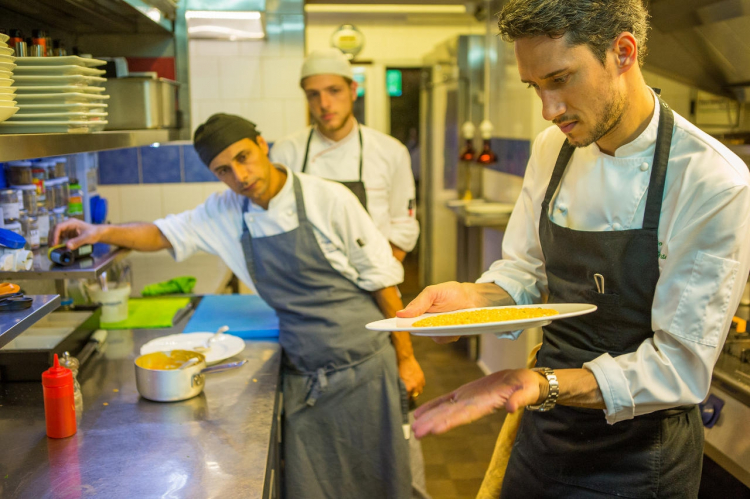
Federico Delmonte at work
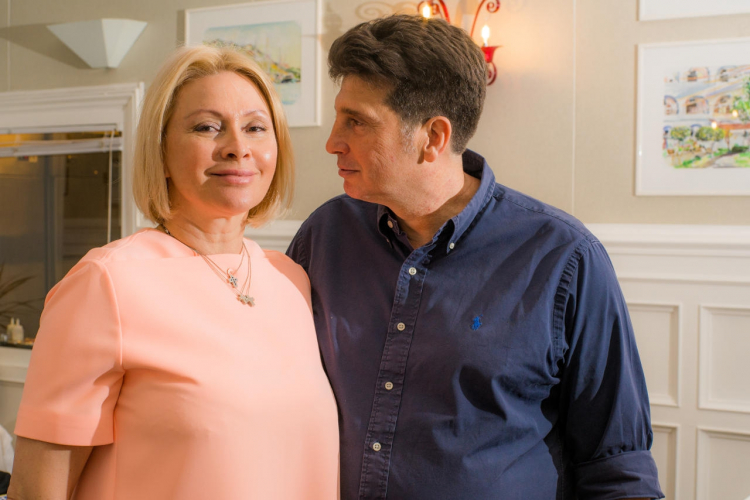
Stefano Chinappi with wife Elena. She helps him in the dining room
Since we have no knowledge of the past, it seems too daring to loudly declare such a judgement: perhaps this is not far from the truth, though, because in Via Augusto Valenziani 19 you can experience a balance (is it stable? We’ll see) that is rare to find. And precious. That is to say one that has an old-style host, the kind that might even seem invasive, but whom you trust with happiness and relax, sided by an unquestionably “modern” chef, capable of alternating dishes based on products, recipes that are part of the patron’s evergreen heritage, with creative preparations of his own, of the highest level. Such as
Scallop, coconut, onion from Suasa and lime: spectacular, complex, vivid, profound, elegant.
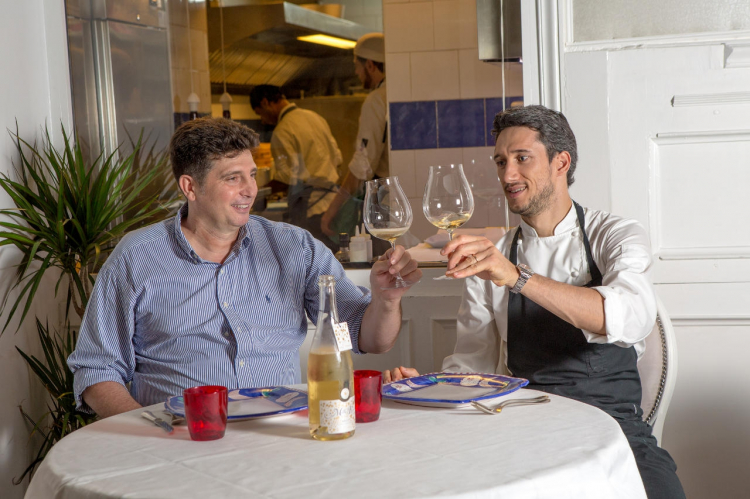
Stefano Chinappi and Federico Delmonte
We must make a premise: one could only find a place like this in Rome. Because
Stefano Chinappi magnificently interprets the role of the Roman inn-keeper that makes food tourists like us go crazy, while it could be that locals find him even too picturesque, too
agé. Their thought, however, would be distorted: because it would limit itself to the surface of things, to the background sounds, without reaching the essence.
What should the task of the good 2.0 host be, after surviving the negative trends of the past few years? Is it someone ready to incarnate a future perspective? He should guarantee the evening is pleasant, a wide concept that goes from empathy to high quality service – friendly if not punctual – and the kitchen, which must first of all present raw materials of the highest quality and perhaps a few timeless dishes, famously craveable, the outcome a certainty. Which doesn’t mean relying on easy to please banality or giving up on elegant flavours. Instead it means presenting signature dishes that can be a sure destination even when, as in this case, someone later arrived in the kitchen with a nice contemporary talent, and his complex and more elegant flavours.
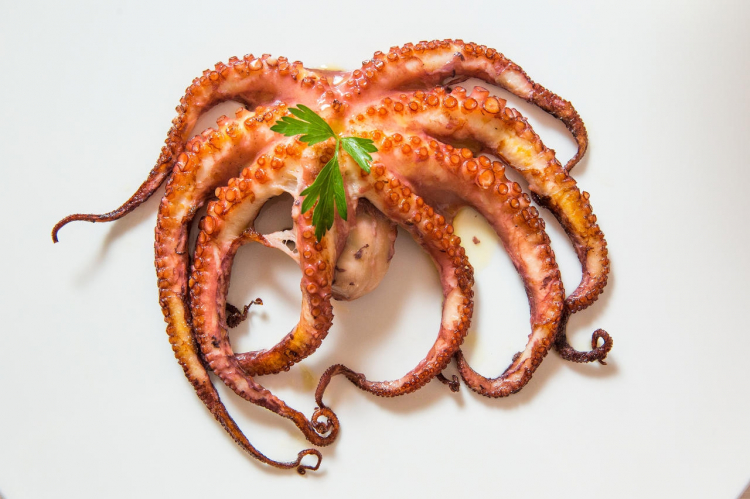
Polpo verace secondo tradizione Chinappi – octopus following the traditional style of Chinappi
This is
Chinappi these days. This is why we like him. Tasting of masterful but timeless specialties, such as the beautiful
Polpo verace secondo tradizione Chinappi, with oil aromatised with parsley and lemon, potatoes and tomatoes – I tasted one that could be compared only to Galicia, which is the culinary capital of the cephalopod – or
Spaghettoro with telline, or
Sogliola, paired with a delicate yet very tasty sauce made with extra virgin olive oil from Itrana olives and lemons from Amalfi: these are examples of how you can present high quality recipes but in a more friendly, immediate way. We need things like this too.
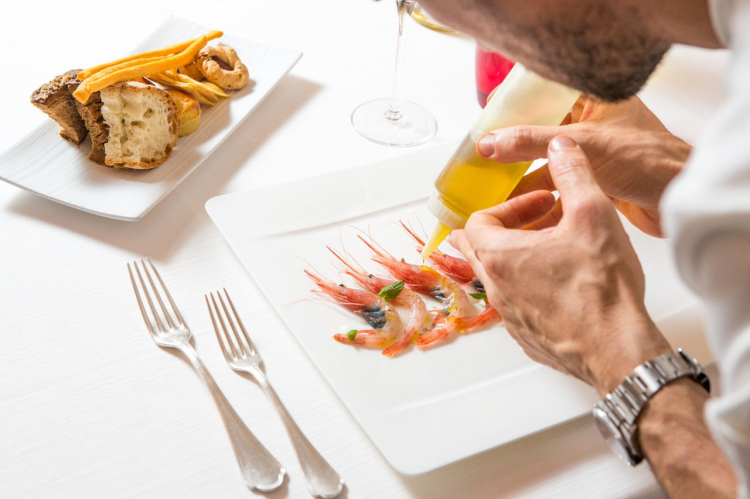
Delmonte prepares Gobbetti di Ponza, oil, lemon, mint, gin gelatine. A great classic among Chinappi’s raw dishes
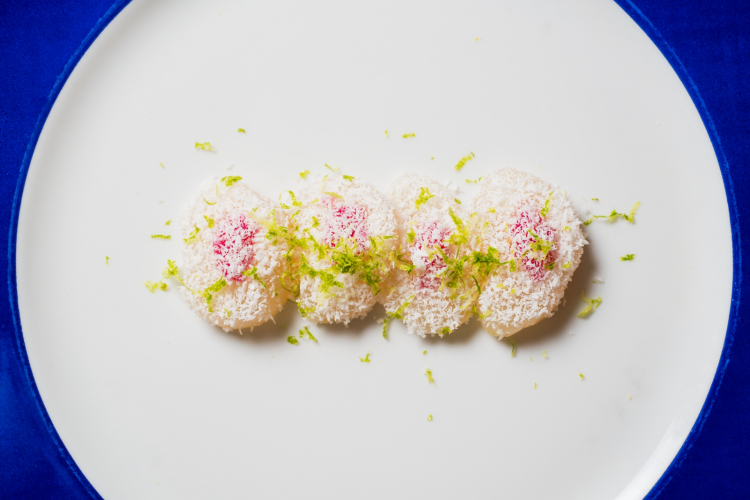
Scallop, coconut, onion from Suasa and lime
Today’s plus is the guy in the kitchen.
Federico Delmonte, from Fano, in the Marche, was born in 1981 and has plenty of talent. He studied catering school in Pesaro, and his cv includes experience at
Dorchester and
Locatelli’s
Zafferano in London, then a small selection of Italian excellences:
Pagliaccio, Povero Diavolo, Magnolia, Pinchiorri. He has a good and justified reputation: in the following days, as I was chatting with
Anthony Genovese, he claimed to having trained him, «he was one of my pupils» in Via dei Banchi Vecchi 129/a, in Rome, he said. This shows he’s appreciated. Rightly so: we’ve already mentioned the scallop (macerated in champagne) but even the
Carpaccio di volpina (mullet), fennel and star anise was exceptional, or the
Squilla mantis from Formia, black cherry juice and raspberry vinegar, paired with an extract of watermelon seasoned with oil, salt and pepper.
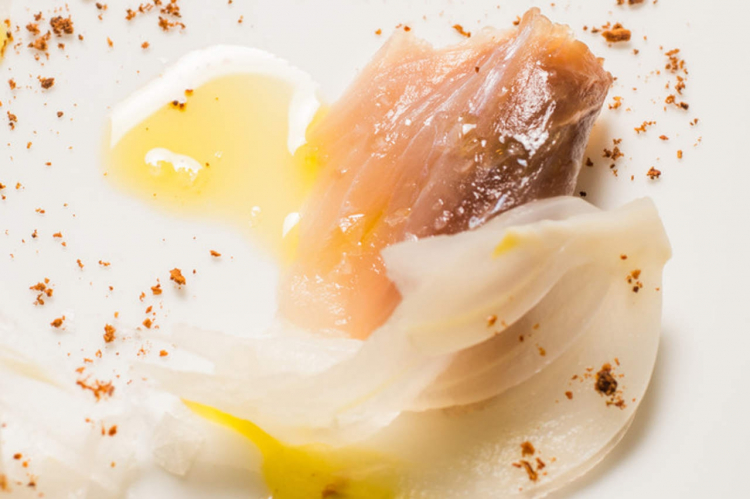
Carpaccio di volpina, fennel and star anise
I forgot to stress that at
Chinappi’s there are great drinks and of course the catch is fabulous, thanks also to his family relations:
Stefano is the son of historic restaurateur
Franco from Formia, so he knows seafood delicacies like the back of his hand. He buys fish daily from the auction in Formia from
Gianni Purificato, the husband of his sister
Sabrina. So basically: the best products. So whatever
Delmonte uses, he knows they’re of the highest quality. And he even manages to enrich it.
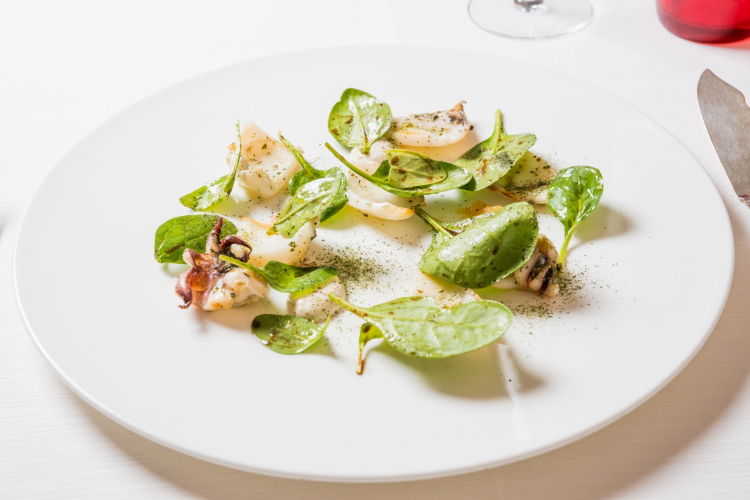
Seared squid, baby spinach and bergamot
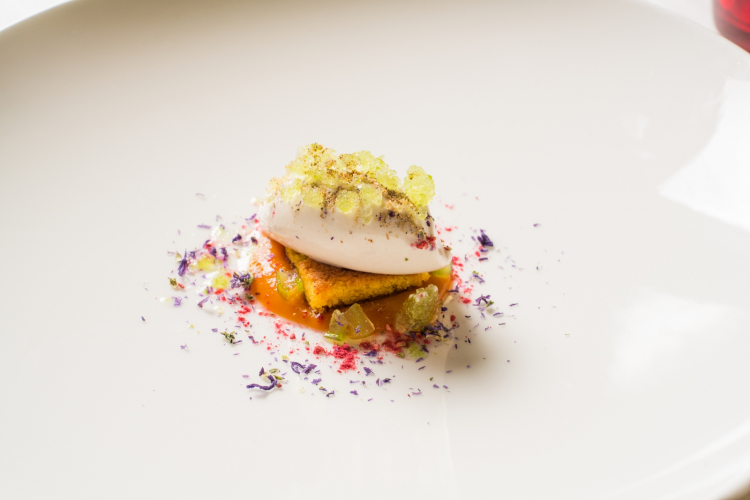
Colours: dessert with almond, celery, carrot and cardamom
At
Chinappi’s you can have a great time, we said in the beginning: even if there’s a sudden storm, as in our case, you end up the evening watching bottles of champagne opened with a saber -
Chinappi is a master at this – in the company of intriguing characters such as pasta-man
Gaetano Verrigni, or brilliant chef
Edoardo Ferrera, who grey haired Milanese gourmets will remember well from the heroic days of
Don Carlos. What more do you want?
Chinappi-Delmonte is a great couple, very different and thus complementary: take advantage of it while it lasts, which we hope will be for a long time.
Translated into English by Slawka G. Scarso